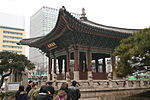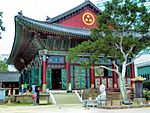Cheongjinok
1937 establishments in KoreaBuildings and structures in Jongno DistrictCompanies of Korea under Japanese ruleKeijōRestaurants established in 1937 ... and 2 more
Restaurants in SeoulSeoul Future Heritages
Cheongjinok (Korean: 청진옥) is a historic Korean restaurant in Cheongjin-dong, Jongno District, Seoul, South Korea. It is the sixth-oldest active restaurant in Seoul, having been founded in 1937. It specializes in the hangover soup dish haejang-guk. In 2013, it was made a Seoul Future Heritage in recognition of its historical value and quality.
Excerpt from the Wikipedia article Cheongjinok (License: CC BY-SA 3.0, Authors).Cheongjinok
Jong-ro 3-gil, Seoul Jongno 1·2·3·4(ilisamsa)-ga-dong
Geographical coordinates (GPS) Address Nearby Places Show on map
Geographical coordinates (GPS)
| Latitude | Longitude |
|---|---|
| N 37.5716 ° | E 126.9793 ° |
Address
Jong-ro 3-gil 30
03156 Seoul, Jongno 1·2·3·4(ilisamsa)-ga-dong
South Korea
Open on Google Maps









